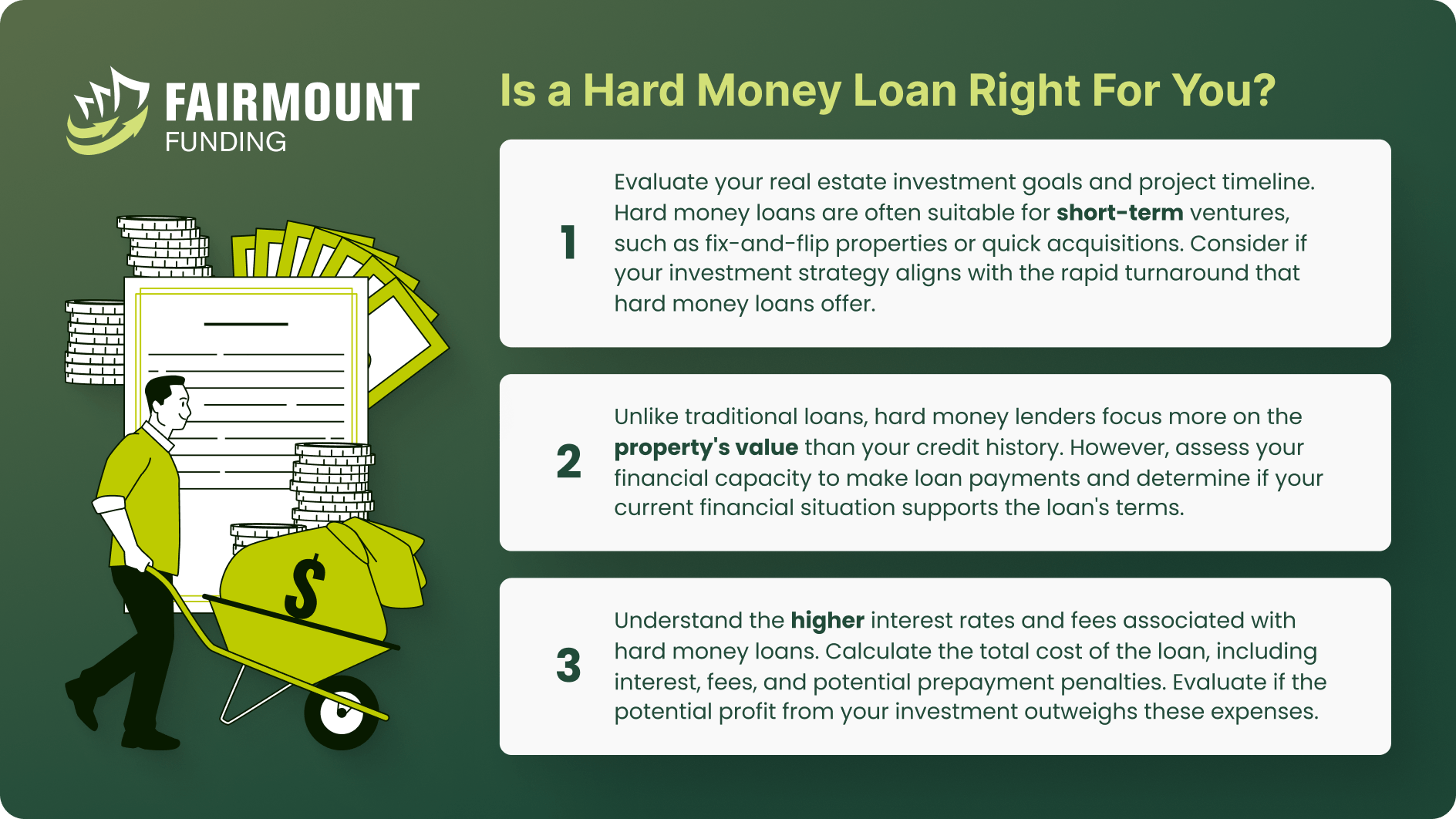
Real estate investing is a popular option to build long-term wealth and serves as another source of income. However, starting this venture requires money, and if you’re interested in becoming one but don’t meet the criteria for conventional financing, or require a fast transaction, there’s an alternative funding avenue to explore: a hard money loan. This loan provides an alternative to standard mortgages, allowing you to acquire and refurbish investment properties; however, it does come with certain disadvantages.
Let’s delve into the concept of a hard money loan, how it works, the steps involved in securing one, and whether it aligns with your financial and real estate objectives.
Different Ways to Use a Hard Money Loan
A hard money loan is used for a wide range of investment types and purposes. Here are some common reasons individuals opt for a hard money loan instead of traditional lending options.
Buying an Investment Property
This approach can prove beneficial when traditional loan approval is hindered by factors such as credit history or the need for a borrowing amount exceeding what conventional lenders are willing to provide. Individuals aiming to invest in rental properties, yet facing challenges in securing traditional financing, may consider getting a hard money loan to finance their investments.
Flipping Homes
Flippers often favor quick financing options due to the rapid pace of flipping projects as they aim to sell the property within a short time frame. A hard money loan offers a fast source of funds and does not have the extended loan terms associated with traditional mortgages.
Investing in Commercial Real Estate
Commercial properties, ranging from office spaces to retail outlets, often demand significant capital for acquisition. Hard money loans provide a swift solution, allowing investors to seize time-sensitive opportunities. The primary advantage is the ability to close deals rapidly, outpacing competitors reliant on traditional bank financing. With the focus shifting from the borrower’s creditworthiness to the property’s potential, hard money loans can be a boon for those looking to invest in commercial real estate.
Residential vs Commercial Hard Money Loans
The choice between residential and commercial hard money loans depends on the type of property being acquired, the scale of the investment, and the borrower’s specific financial and investment objectives.
Residential hard money loans primarily cater to individual investors or small-scale developers looking to finance the purchase, renovation, or refinance of residential properties such as single-family homes, duplexes, or small apartment buildings. These loans are typically more accessible and flexible compared to traditional mortgage financing, making them appealing to borrowers who may not meet conventional lending criteria due to factors like credit history or the property’s condition. Hard money loan interest rates for residential properties are often higher as they feature shorter loan terms and reflect the perceived higher risk associated with residential properties.
On the other hand, commercial hard money loans are designed for investors or businesses looking to acquire, improve, or refinance commercial properties like office buildings, retail spaces, industrial facilities, or multi-unit apartment complexes. These loans are typically larger in scale and are intended for more substantial real estate investments. Commercial hard money loans are often sought for time-sensitive transactions or when conventional lenders are hesitant due to property-specific factors. They can offer greater flexibility in terms of loan structure and may have longer repayment periods compared to their residential counterparts.
What are the benefits of getting a hard money loan?
Investors can benefit from hard money loans over conventional bank mortgages. Here are the main benefits it offers to investors:
- Quick Access to Funds: The process of applying for a mortgage, especially with the new Dodd-Frank Act regulations, is incredibly time-consuming and can drag on for months, potentially causing investors to lose out on promising property investments. In contrast, a hard money loan offers a swift funding alternative, often providing the necessary funds within a matter of weeks. This speed is particularly vital when financing extensive development projects, ensuring that the project timeline remains on track without costly delays.
- Flexible Approval Criteria: Unlike traditional banks, hard money lenders primarily assess the value of the property being used as collateral rather than the borrower’s credit score or financial history. Hard money loan requirements make it easier for individuals with less-than-perfect credit or a complex financial situation to qualify.
- Customizable Loan Terms: As hard money loans are provided by private lenders, there is often greater flexibility for investors to negotiate the loan terms. This may involve customizing the repayment schedule to better align with your requirements or potentially securing reductions or waivers for specific fees, like the origination fee, during the underwriting process.
Hard Money Loan Rates
Hard money loan rates are distinctive in nature when compared to traditional mortgage rates. These rates tend to be notably higher due to several factors that differentiate hard money lending from conventional bank financing.
One primary factor influencing the higher interest rates associated with hard money loans is the elevated level of risk involved. Unlike traditional lenders who focus on borrower creditworthiness and income, hard money lenders primarily assess the value of the property being used as collateral. Since hard money loans are often used for high-risk ventures like real estate flips or investments in properties with significant issues, lenders charge higher interest rates to mitigate their potential losses.
The interest rates on hard money loans can vary widely depending on the lender, the property, and the borrower’s circumstances. Typically, borrowers can expect interest rates ranging from 8% to 15% or even higher. These rates can fluctuate based on the perceived risk of the loan and market conditions. To calculate the precise interest rate for a specific hard money loan, borrowers often use a hard money loan calculator. This tool takes into account factors such as the loan amount, the property’s value, the loan term, and other relevant details to provide a more accurate estimate of the interest rate and associated costs.
What are good hard money loan alternatives?
If hard money loans don’t fit your financial strategy, there are several other funding alternatives to explore. It’s essential to carefully assess and compare these options to find the one that best aligns with your real estate investment goals and financial situation.
- Private money loan. Reaching out to family, friends, or acquaintances for a private money loan is an option. However, borrowers should be prepared for potential challenges, such as negotiating terms with private lenders and addressing any personal dynamics that may arise from borrowing from friends or family.
- Home equity line of credit (HELOC). A Home Equity Line of Credit (HELOC) is an attractive alternative to a hard money loan, particularly for homeowners who have built up substantial equity in their properties. HELOCs are essentially revolving lines of credit that allow borrowers to tap into the equity they’ve accrued in their homes.
- Renovation loans. A renovation loan, also known as a rehab loan, is specially designed for properties that need repair or remodeling. These loans typically finance both the purchase price and the renovation costs, offering a consolidated loan solution. For investors looking to upgrade a property before selling or renting, renovation loans can be an ideal choice. In particular, Fairmount offers favorable terms for real estate investors seeking a multifamily renovation loan.
Hard Money Loan FAQs
How does hard money differ from cash?
While hard money loans are not cash, they are often regarded as a cash equivalent because they deviate from the conventions of traditional loans. However, it involves borrowing from private lenders, offering speed but at the cost of interest payments and shorter loan terms. Cash, on the other hand, refers to using one’s own funds, allowing for immediate transactions with lower risk as there are no loan obligations and without interest expenses. However, it may limit the number of investments an individual can undertake simultaneously due to capital constraints.
Do I need a good credit score for hard money?
No, you typically do not need a good credit score for hard money loans. Unlike traditional loans where a strong credit history is a significant factor, hard money lenders primarily base their lending decisions on the value of the property being used as collateral and the potential for profit from the investment.
What are the risks involved in getting a hard money loan?
Hard money loans generally come with higher interest rates, reflecting the increased risk assumed by hard money lenders. Borrowers may also be required to provide a larger down payment due to the lender’s risk assessment. Furthermore, hard money loans typically have significantly shorter terms compared to traditional mortgages, often necessitating repayment within one to three years.
Considering a Hard Money Loan?
Deciding whether a hard money loan suits your needs depends on your unique financial situation. While these loans have their advantages, it’s important to keep in mind that there are risks and costs associated with them that require careful consideration.
Just like any other form of borrowing, it’s essential to have a well-thought-out plan for repayment before taking out a hard money loan. Missing payments could result in the loss of the property you’ve offered as collateral and potentially harm your credit score. However, on the positive side, successfully managing a hard money loan can provide you with swift access to funds for real estate investments and opportunities that may not be attainable through traditional lending channels. So, while exercising caution and planning ahead is necessary for success, these loans can be an invaluable tool for certain financial strategies.
KEY TAKEAWAYS
- Hard money loans provide investors with quick access to funds, flexible approval criteria, and customizable loan terms.
- Hard money loans provide investors with quick access to funds, flexible approval criteria, and customizable loan terms, making them advantageous for real estate investments and development projects.
- The heightened level of risk involved is a key factor contributing to the higher interest rates commonly seen with hard money loans.


